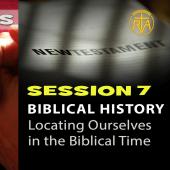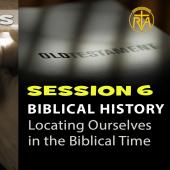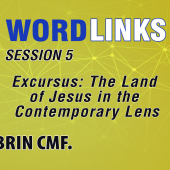WORDLINKS 1: General Introduction to Study of the Bible
WORDLINKS 1
Our itinerary: (1) General Introduction to Study of the Bible; (2) Introduction to the Tools for Informed Study of the Bible; (3) General Background of the Sacred Scriptures; (4) Major Divisions and its Theological Themes; (5) Book-by-book Study and Exegetical Exposition of Selected Texts.
I. General Introduction to the Study of the Bible
A. Engaging with Scriptures
Biblical text as literary text: Text as literature
The text we are dealing with is undeniably a piece of literature. Thus requires proper methods to understand it (exegesis). In the text, there are narratives and historical data that are oftentimes all mixed. There are also diverse forms (oracles, parables, hymns, poems, prayers, laments, among others); and styles (speeches, narratives, among others) we find in the Biblical text.
Biblical text as faith text: Text as sacred
The Scriptures possess authority for someone or some group that exceeds normal conditions. As authoritative documents, Scriptures occupy an official position in the life of the communities or groups that regard them as Scripture.
The texts we are dealing with are faith reading of history or an interpretation of a historical event from the perspective of faith (search for meaning). They are always concerned with God-people relationships. Meaning is the central focus of the text rather than reporting facts as we understand today.
B. Formation of the Bible
We can identify 5 stages of the formation of the Bible: (1) Experience; (2) Story; (3) Writing; (4) Collection and redaction; (5) Final form.
Experience: The Biblical text did not fell from heaven. They were borne out of the experience. Experience first before they were committed to text.
Story (memory): Experiences were interpreted from the faith perspective; they were later passed to generations and generations with different emphasis and meaning depending on the contemporary historical situations.
Writing: After so many years, they were committed to writing, obviously, with different contemporary contexts and messages.
Collection and redaction: These written fragments started to collected and edited, obviously with different contemporary contexts and messages.
Final form: Then it reaches the final stage where a contemporary community received it and declared them as the Sacred Scriptures (authoritative and binding for them), obviously with different contemporary contexts and messages.
Experience is always bigger than the story. The story is still more extensive than those committed to writing. Not all written texts were collected. Not all collected text gets through the final form.
The reverse is true. Through all the process (text growth or text development), there may be some additions, embellishments, and subtractions along the process.
This process has a significant consequence for the task of interpretation. In dealing with the Biblical text, we have to “read between the lines.” For this, we need methods of understanding and interpreting the text.
C. Need for methods
Against literalist interpretation
Conscious of the Biblical textual growth, we have to avoid by all means a literalist interpretation. This kind of interpretation is not the same as literary interpretation. Literary interpretation follows the rules of literary methods to understand the text. While literalist interpretation takes simply the text as it is not critically.
Methods of interpretation
To understand the text critically means we have to use critical tools or methods to understand the text. They are like a bunch of keys that help us unlock the doors of the text. There are two (2) basic families of methods: those which give attention to the text and its context (diachronic), and those which give attention only to the text itself (synchronic).
Text in Context: historical background
The focus of the study is the text in its context. The text does not exist in a vacuum; it is always contextualized. Since the text, we are dealing with passes through the developmental process. Thus all the more context should be considered: historical events, geographical settings, cultural paradigms, mental structures, among others.
Text: structure; keywords; flow
While the entire historical context is difficult to reconstruct, the text itself may provide insights and tools to unlock its meaning through the study of its structure, keywords, and its flow, among others.
Emphasis on meaning
It is essential to understand that Biblical authors are more concerned with registering message or meaning rather than being primarily concerned with reporting facts. The biblical study should give
more emphasis on the search for meaning rather than meticulously looking for factuality as we understand today.
Layers of meaning
As the text we are dealing with has gone through a “growth process,” then we should be conscious that there may be layers of meaning that we have to discover.
Always relational: self, God, others and creation
Again, our text is a faith text; it always connects us to God and others. Our study is futile if it does not bring in us a more fruitful relationship with God, with others, and with the entire creation. The real study of the Bible should lead us to contemplation and humble service of love.
Continuation: Task of Biblical Interpretation: Methods and Pastoral Applicability
Follow us at:
https://www.facebook.com/wordlinks.claret/
Radio Veritas Asia (RVA), a media platform of the Catholic Church, aims to share Christ. RVA started in 1969 as a continental Catholic radio station to serve Asian countries in their respective local language, thus earning the tag “the Voice of Asian Christianity.” Responding to the emerging context, RVA embraced media platforms to connect with the global Asian audience via its 21 language websites and various social media platforms.
















- Reply
Permalink